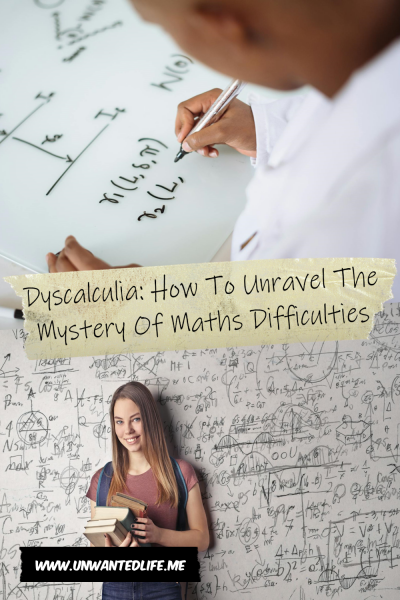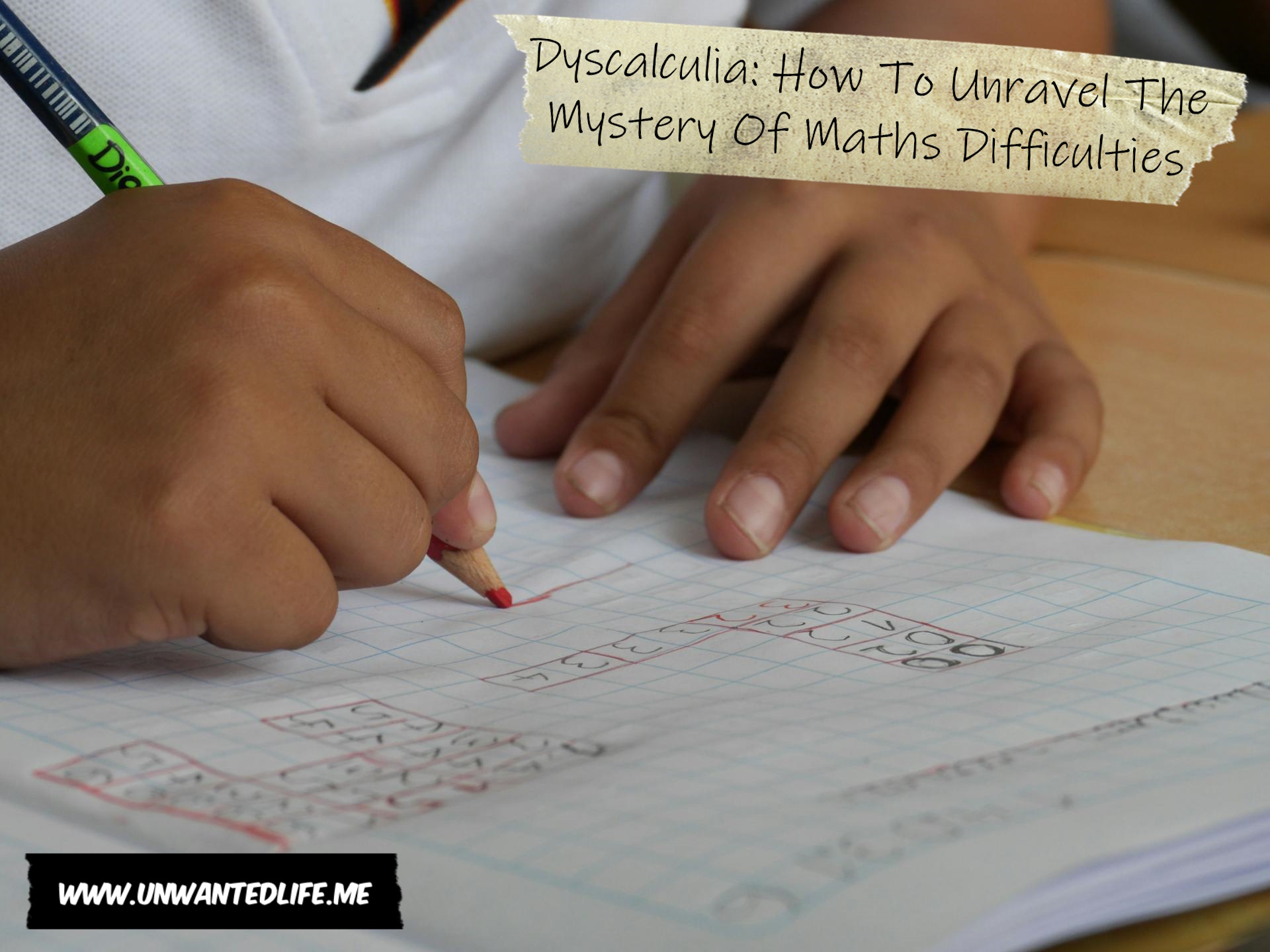I’ve used my blog to help people learn a bit more about dyslexia, as it’s a condition I was diagnosed with very late in life. However there are other conditions that can affect a person’s academic ability, and one of those is dyscalculia. Therefore, I thought I’d use my blog again to shed light on this lesser-known invisible condition.
What Is Dyscalculia?
This is something that appears to differ between the UK and the USA, where the UK sees dyscalculia as a learning difficulty (Mencap), but in the US, they seem to have this as a learning disability (Understood). However, as I’m not American, I don’t know if this is a commonly accepted way of categorising dyscalculia. All I know for sure is that it’s considered a learning difficulty, and not a learning disability like autism, in the UK.
Dyscalculia affects one’s ability to understand and perform math operations. It’s distinct from general learning difficulties and impacts individuals across all ages and intelligence levels. People with dyslexia can also experience difficulties with maths, with about 60% of those with dyslexia experiencing issues with maths (British Dyslexia Association), which I also fall into.
For me, this is my main problem with maths. I can forget something I’ve finally figured out how to understand and use. I can spend hours trying to figure out how to use one specific psychological statistic method, leave notes, come back to it the day after, and be clueless again, even though I have those notes that I wrote so it would make it easier to understand what I figured out. Deeply frustrating. And I only have dyslexia.
According to Shalev (2004), there is genetic, neurobiological, and epidemiologic evidence, which indicates that dyscalculia is a brain-based disorder, like other learning disabilities and difficulties. This is supported by Von Aster and Shalev (2007), who also say that it’s a genetic, neurobiological, and epidemiological determined disorder of ‘number sense’.
As reported by Price and Ansari (2013) in their study, there’s an estimate for the prevalence of dyscalculia being between 3-6% of the population. A figure that’s similar in frequency to those with dyslexia and attention deficit hyperactivity disorder (ADHD; Shalev, Auerbach, Manor, and Gross-Tsur, 2000).
Therefore, it’s important to remember that the difficulty with the normal acquisition of arithmetic skills isn’t a reflection of that person’s intelligence (Shalev, 2004; and Kaufmann and Von Aster, 2012). In the UK, if something can affect someone’s intelligence, then that is what is considered a learning disability, rather than a learning difficulty.
What Are The Dyscalculia Challenges?
Number sense
People with dyscalculia may experience difficulties in understanding the meaning and value of numbers, comparing quantities, and manipulating numbers in their minds.
Calculation
Someone with dyscalculia may have difficulties performing basic arithmetic operations like addition, subtraction, multiplication, and division.
Math symbols and concepts
If someone has dyscalculia, they may find it difficult to understand and apply maths symbols, concepts like fractions and decimals, and problem-solving strategies.
Spatial reasoning
A person with dyscalculia might find it difficult to visualise and manipulate spatial relationships relevant to maths, like interpreting graphs or diagrams.
The Impact Of Living With Dyscalculia
Mental wellbeing
There are several ways dyscalculia can affect your mental wellbeing. Someone with this learning difficulty may experience frustration, anxiety, and low self-esteem, especially if their peers aren’t struggling with maths because they grasp maths concepts easily. This is because they’ll feel different to their peers. My dyslexia made me think I was stupid, and that undermined my self-esteem.
It shouldn’t be a surprise, but mental health issues are much more common among children with learning difficulties (30-50%) than among their peers without learning difficulties (8–18%; Kaufmann and Von Aster, 2012).
Then there’s the distress that children can experience with dyscalculia, just like with dyslexia, because they do poorly in school; resulting in a negative attitude about maths tasks, or even leading to maths anxiety and school phobia. Thus, they may learn avoidance-based behaviours.
Maths anxiety can be both the cause of and symptomatic of dyscalculia. This means children affected by maths anxiety are reported to sacrifice accuracy for speed and perform poorly in the most basic maths exercises (Shalev, 2004).
Struggles with schoolwork and academic performance
It goes without saying, but someone with dyscalculia, if they don’t get the appropriate support, will struggle with maths-related subjects. That’s not just maths classes, but social sciences, natural sciences, sports science, etc. This can, and will, negatively impact their education (Kucian and Von Aster, 2015). As such, school dropouts are more frequent among those with dyscalculia (Shalev, 2004).
Numerical skills are essential in our everyday life
There is a widespread misunderstanding of how important maths is (Kucian and Von Aster, 2015). You’ll often see memes and tweets about how no one uses their maths skills in the real world. However, people with dyscalculia will struggle with basic calculations, like budgeting or measuring ingredients. Then there’s the ability to understand financial information (Price and Ansari, 2013) and understanding bills.
The role of maths is becoming even more crucial with the increasing role of technology in contemporary society, meaning that impairments in the development of number processing and calculation will harm professional careers (Kucian and Von Aster, 2015). This will present a disadvantage in the job market as more roles require an understanding of maths, or at least a basic understanding of processing numbers (Kaufmann and Von Aster, 2012).
Immature calculation strategies
I don’t like how I framed that for a subtitle, so forgive me. I couldn’t think of a better way of saying it, sorry. By immature calculation strategies, I mean someone may have to use strategies that wouldn’t normally be used for their age and level of education (Price and Ansari, 2013). An example of such a method would be to resort to counting on their fingers.
Getting A Dyscalculia Diagnosis
While there’s no single test for dyscalculia, diagnosis often involves evaluations by qualified professionals, such as psychologists, educational specialists, or neuropsychologists. There will also likely be assessments of cognitive skills related to maths and other areas. Educational history and observations of difficulties with maths concepts and tasks would also be considered.

Treatment And Strategies
According to Kucian and Von Aster (2015), ambitious efforts are needed to help support people with dyscalculia by transforming basic knowledge about the neurocognitive development of number processing into evidence-based practical applications.
Fortunately, there are already strategies in place. The use of intervention plans typically focuses on explicit instruction, where information about maths concepts would get broken down into smaller, more manageable steps (reminds me of goals and SMART goals), and teaching specific strategies for solving problems.
There are also specialised learning tools and technology, which sounds similar to the support I was offered for my dyslexia while doing my postgraduate degree. If only I’d been diagnosed sooner. Anyway, someone with dyscalculia would be offered assistive devices like calculators, manipulatives, and math software. And if it’s anything like my experience with dyslexia, you’d likely be allowed to use those calculators when others might not be when taking exams.
Educational and work settings should also make accommodations to support you in those settings by providing extended time for exams, allowing alternative methods for presenting math problems, and offering individualised more tailored support. Not everyone with dyscalculia will need the same kind of support (Kaufmann and Von Aster, 2012). People with dyscalculia can struggle with different aspects of mathematics.
Summary
Remember, dyscalculia, just like dyslexia, is not a reflection of intelligence or effort. It’s a neurological difference that requires understanding and support. Early diagnosis and interventions are crucial for developing coping mechanisms and building maths confidence. With the right support, people with dyscalculia can achieve success in academics, careers, and everyday life. Just like is possible with other learning difficulties like dyslexia.
I hope this article helped you understand this lesser-known learning difficulty.
As always, leave your feedback in the comments section below. Also, please share your experiences with dyscalculia or other learning difficulties/disability in the comments section below as well. Don’t forget, if you want to stay up-to-date with my blog, then sign up for my newsletter below. Alternatively, click the red bell icon in the bottom right corner to get push notifications for new articles.
Lastly, if you’d like to support my blog, then there are PayPal and Ko-fi donation payment options below. Until next time, Unwanted Life readers.
References
Kaufmann, L., & Von Aster, M. (2012). The diagnosis and management of dyscalculia. Deutsches Arzteblatt international, 109(45), 767–778. Retrieved from https://doi.org/10.3238/arztebl.2012.0767 and https://www.ncbi.nlm.nih.gov/pmc/articles/PMC3514770.
Kucian, K., & von Aster, M. (2015). Developmental dyscalculia. European journal of pediatrics, 174, 1-13. Retrieved from https://www.zora.uzh.ch/id/eprint/104168/1/ZORA_NL_104168.pdf.
Price, G. R., & Ansari, D. (2013). Dyscalculia: Characteristics, causes, and treatments. Numeracy, 6(1), 2. Retrieved from https://link.springer.com/article/10.1007/s00431-014-2455-7.
Shalev, R. S., Auerbach, J., Manor, O. H. A. D., & Gross-Tsur, V. (2000). Developmental dyscalculia: prevalence and prognosis. European child & adolescent psychiatry, 9, S58-S64. Retrieved from https://www.researchgate.net/profile/Judy-Auerbach/publication/12190127_Developmental_dyscalculia_Prevalence_and_prognosis/links/5fccd55c45851568d142e1e5/Developmental-dyscalculia-Prevalence-and-prognosis.pdf.
Shalev, R. S. (2004). Developmental dyscalculia. Journal of Child Neurology, 19(10), 765-771. Retrieved from https://secure3.convio.net/pch/assets/pdfs/Dyscalculia-6.pdf.
Von Aster, M. G., & Shalev, R. S. (2007). Number development and developmental dyscalculia. Developmental Medicine & Child Neurology, 49(11), 868-873. Retrieved from https://onlinelibrary.wiley.com/doi/pdfdirect/10.1111/j.1469-8749.2007.00868.x.


Very interesting and very informative to help people with this, love your treatment strategies section as they are great ones. Thank you for sharing!
Thanks for commenting
When I worked as a teacher, I found that some of my colleagues (especially older generations) had a hard time dealing with kids who I thought might be struggling with dyslexia and dyscalculia. Especially the latter, they wanted to believe it was laziness… And who does that help, exactly? Awareness is so important so people can get the help and accommodations they need.
When I was at school, they made zero effort for such conditions and wouldn’t even accommodate the differences in how we learn best, so it doesn’t surprise me to hear that you experienced that when working as a teacher. I really hope schools are different now. Thanks for sharing
So glad to see more awareness and help for children with dyscalculia. I have it, although it was never diagnosed. I had some awful times at school. At work I had to manage very large budgets and had to develop coping strategies, including getting my husband to help. Thanks for this great post.
Sorry to hear you never got officially diagnosed and thus missed out on the support that would have provided. Thanks for sharing
Great to see that much more is being written and implicated about this issue nowadays
Thanks for commenting
I have heard about this. I have Dyslexia and I really struggle with math.
Thanks for sharing